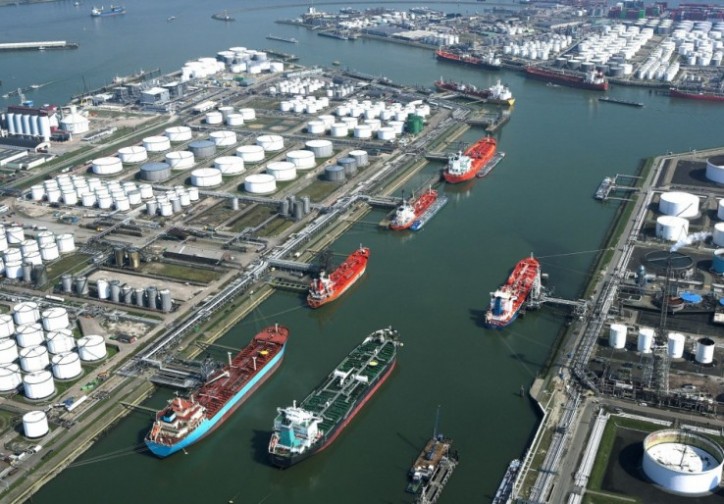The queue of ships waiting outside Europe’s biggest port and oil-trading hub of Rotterdam has grown to the longest in seven years as a global supply glut fills storage capacity.
As many as 50 oil tankers, twice as many as normal, are waiting outside Rotterdam because storage sites are almost full, the port’s spokesman Tie Schellekens said by phone on Tuesday.
“This is a clear sign of the oversupply filling up storage to the brim,” Gerrit Zambo, an oil trader at Bayerische Landesbank in Munich, said by phone. “People are preferring to store oil rather than cut production. These are bearish signs.”

The world is so awash with oil that BP Plc Chief Executive Officer Bob Dudley said last month people will be filling up their “swimming pools” with it this year. Traders are taking advantage of a market contango, where forward prices are higher than current prices, by buying oil cheap, storing it and selling the commodity later. As onshore storage fills up, companies could start stockpiling at sea in a repeat of a strategy last seen in 2008 and 2009.
Near Capacity
Crude oil in storage tanks in Rotterdam stood at 51.3 million barrels on Feb. 19, the highest for the time of year in data starting in 2013, according to Genscape, which monitors inventories. Royal Vopak NV, the world’s largest oil-storage company, last week reported a fourth-quarter occupancy rate of 96 percent at its 11 terminals in the Netherlands compared with 85 percent a year earlier.
The situation in Rotterdam mirrors that in the biggest U.S. storage hub of Cushing in Oklahoma, where stockpiles are at a record high.
“In Cushing and probably Rotterdam storage is filling up very quickly,” said Giovanni Staunovo, an analyst at UBS Group AG in Zurich, Switzerland. “In China, given high oil imports, there are too many ships and the infrastructure seems not be able to handle that.”
Saudi Arabia, the world’s biggest oil exporter, said last month it won’t cut production to ease global oversupply, while Iran has pledged to increase output after sanctions were lifted in January. Still, oil climbed on Tuesday from the highest close in more than seven weeks on speculation that monetary stimulus in China could help revive flagging economic growth in the world’s second-biggest fuel consumer.
Price Contradiction
Brent crude, the international benchmark, rose as much as 1.3 percent to $37.05 a barrel on the London-based ICE Futures Europe exchange, after prices gained 6.3 percent last week.
There is a “contradiction” between the increase in oil prices and the physical supply and demand situation seen in Rotterdam and Cushing, Zambo said. With storage tanks filling up, oil prices for immediate delivery would probably fall while cargoes for future delivery would increase, resulting in a deepening of the market contango.
Chris Bake, a senior executive at Vitol Group, the world’s largest independent oil trader, said in February that traders are considering storing oil at sea, a strategy last employed in 2008 and 2009.
“Primary and secondary storage is pretty much full,” Bake said. “It’s probably a good time to be a vessel owner.”
Super-Contango
On Feb. 11, U.S. benchmark West Texas Intermediate for delivery in four months traded $6 a barrel higher than that for one-month supply, the widest gap in five years. The premium has since narrowed to $3.88 a barrel on Tuesday.
That’s still some way off the $15 premium reached in January 2009, a “super-contango” that helped traders make billions of dollars from storing oil in supertankers moored in sheltered anchorages in the North Sea, the Persian Gulf, the Singapore Strait and off South Africa.
Source: Bloomberg